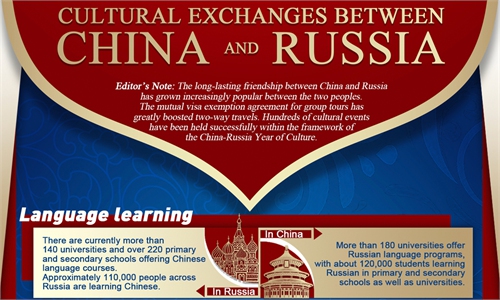
Photo: VCG
Editor's Note:
Chinese President Xi Jinping is paying a state visit to Russia from May 7 to 10 and will attend the celebrations marking the 80th anniversary of the Victory in the Great Patriotic War in Moscow, at the invitation of Russian President Vladimir Putin. What is the significance of this visit? What kind of new paradigm have China and Russia created for international relations? Global Times (GT) reporter Wang Zixuan talked to Fyodor Lukyanov (Lukyanov), chairman of the Presidium of the Council on Foreign and Defense Policy and research director of the Valdai Discussion Club in Russia, over these issues.
GT: Last year, President Xi met with President Putin three times. This year marks the 80th anniversary of the Victory in the Great Patriotic War in Moscow, and President Xi was invited to attend the celebrations in Russia. What is the significance of this visit?
Lukyanov: World War II (WWII) was the landmark event that defined the entire epoch of international development in the second half of the 20th century and beyond. Countries organized around different political and social principles came together to withstand a group of utterly aggressive countries led by an obscure antihuman ideology. That was a unique international moment to defend peace, dignity and progress. Russia and China were the driving forces of this struggle in Europe and Asia, respectively. As some states and politicians have tried to revise the historic significance of the war, ideologies that once seemed defeated forever are on the rise again. Russia and China clearly demonstrate their unity in the new international arena, and both countries emphasize during this 80th anniversary that they are still guardians of the principles that mankind defended during WWII.
GT: President Putin once said that China-Russia relations have reached "an unprecedented level." Still, some people in the West remain skeptical about the sustainability of China-Russia ties. Can this attempt to sow discord between Moscow and Beijing work?
Lukyanov: The West remains skeptical about everything that doesn't come from the West. It still aspires to guide the whole world, despite the fact that it has been proven this wish can no longer become a reality. The West is unwilling to face the reality of the world - all countries do what they believe suits them best for their security and development. Paradoxically no one, neither Russia, nor China in particular, does anything against the West's legitimate interests. Other countries simply want to pursue their own interests. But the West sees this as something directed against it in the hegemonic spirit. I don't believe that we need to pay attention to their reaction to our strategic partnership. It is simply not the West's business. Sooner or later, they will accept it.
GT: At present, practical cooperation between China and Russia is flourishing. Last year, the bilateral trade volume exceeded $244 billion, making China the largest trading partner of Russia for 15 consecutive years. In light of external interference, what do you think is the key to these achievements and the consistent high-level China-Russia cooperation?
Lukyanov: Very simple, this cooperation is natural, organic, serves the interests of both countries, and reflects the general international trend toward collaboration, not fragmentation, with deep, exceptional personal relations between leaders. It's as simple as that.

Fyodor Lukyanov Photo: Courtesy of Lukyanov
GT: What's your opinion on the abuse of tariffs by the US? Against this backdrop, how can China and Russia further tap into their trade potential?
Lukyanov: The US government is very consistent in its attempts to force other countries to obey the US interests and neglect their own. The current US administration loves to use tariffs to achieve its goals; by doing so, it undermines the very principle of the international economic system, which has been eagerly promoted by the US itself. The White House will not succeed, certainly not with strong countries like China and Russia. The US will miss opportunities and lose momentum in development.
GT: When Member of the Political Bureau of the CPC Central Committee and Foreign Minister Wang Yi visited Russia in April, he noted that China-Russia relations now have three characteristics: First, ever-lasting friendship and never becoming enemies. Second, equality and win-win cooperation. Third, non-alliance, non-confrontation and not targeting any third party. Some hold that China and Russia set a model for a new type of international relations and relations between neighboring major countries. In your view, what kind of new paradigm have China and Russia created for international relations? What does this mean for the current international order?
Lukyanov: I don't think we can talk about an "international order" at this point. It has been deeply eroded in recent years, and now the US is still working on dismantling it. We need to establish new forms of relations between nations. Russia and China have demonstrated an impressive ability to adjust their relations to the ever-changing international environment, and are making this relationship work ever better with changes. The key to the harmonious relationship is a total absence of any expansionist ambitions vis-à-vis each other and full mutual acceptance of national cultures, values and views based on them. Neither side wants the other to change; just the opposite, we enjoy flourishing diversity and multiformity. That is contrary to what the West sees as a must - unanimity based on Western universalism, which doesn't work.
GT: Compared with the zero-sum game among traditional major powers, China and Russia have established a relationship based on equality, mutual respect, and mutual benefit, guided by head-of-state diplomacy. Amid the rising unilateralism and Cold War mentality, what inspirations does a mature and stable China-Russia relationship offer to the relations of other major powers in the world?
Lukyanov: A few life hacks. Think about the wealth of your people first. Offer lucrative opportunities to partners in return for the same for you. Be polite, always look for a cooperative approach. Don't get involved in trouble which doesn't hurt your interests, while firmly defending the interests you consider vital. And the main principle - respect your partners.



